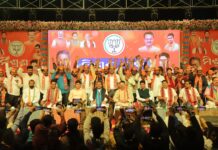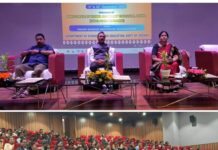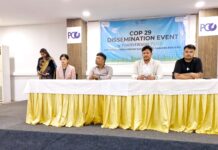
By Our Correspondent
BHUBANESWAR: To combat the threat of intestinal worms among women of reproductive age and children, the Odisha’s Department of Health and Family Welfare, along with UNICEF, is gearing up to conduct a state-wide deworming campaign on August 10, 2023. A deworming mop-up round (MUD) will be held on August 17 for beneficiaries who missed the dose on August 10.
Addressing a press conference in Bhubaneswar, Dr Bijay Kumar Panigrahi, Director, Department of Health and Family Welfare, emphasized the significance of deworming and the need to raise awareness among parents and caregivers. “Our ultimate goal is to ensure that children remain free from intestinal worms and safeguard women of reproductive age from developing anaemia”, he added. “The campaign will be implemented vigorously across anganwadis and all schools aim to reach about 1 crore beneficiaries across the state.”
Speaking at the event, Sourav Bhattacharjee, Nutrition Specialist, UNICEF stressed on the importance of deworming as an effective intervention to reduce worm infestation and tackle anaemia in the state. He added “Deworming intervention will contribute significantly to the state government’s AMLAN programme which aims to reduce anaemia among adolescent girls and women.”
This year’s primary objective for NDD is to deworm all children aged between 1 and 19 years, as well as women of reproductive age (20 to 24 years), excluding those who are not pregnant or lactating. The distribution will take place biannually, in February and August, with the upcoming round scheduled for August 10, 2023, followed by a Mop-Up Day (MUD) on August 17, 2023.
During NDD, children aged 1–19 years will receive Albendazole (in tablet or suspension form) at their respective schools and anganwadi centers, facilitated by teachers and anganwadi workers. Children aged 1–5 years will receive age-appropriate Albendazole suspension, while those aged 6–19 years and women of reproductive age (20–24 years) will each receive an Albendazole tablet.
The August round of NDD will encompass 19 districts – Bolangir, Bhadrak, Boudh, Balasore, Cuttack, Deogarh, Gajapati, Jagatsighpur, Kandhamal, Kalahandi, Kendrapada, Khurda, Koraput, Malkangiri, Nabrangpur, Nuapada, Puri, Nayagarh, and Rayagada. Additionally, children aged 1-2 years in 11 LF-MDA districts, including Angul, Bargarh, Dhenkanal, Ganjam, Jajpur, Keonjhar, Sundergarh, Sonepur, Sambalpur, Jharsuguda, and Mayurbhanj, will be also covered.
In conjunction with this effort, the Vitamin A Supplementation (VAS) will also be administer to the age-appropriate to children aged between 9 months to 5 years.
The successful implementation of NDD is a collaborative effort, with support from the Department of Health and Family Welfare, the Department of School and Mass Education, the Department of Women and Child Development, the Department of ST and SC Development, and other development partners.
The press briefing was attended by Dr Sanjay Sahoo, Nutrition officer, UNICEF, Dr. Smruti Ranjan Patnaik, Joint Director of Nutrition, Family Welfare Department Govt of Odisha, and Dr. Pratima Pradhan, Joint Director, Child Health, Family Welfare Department.


























